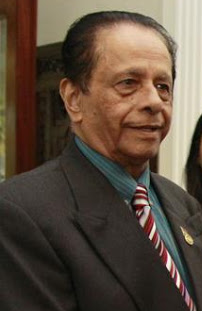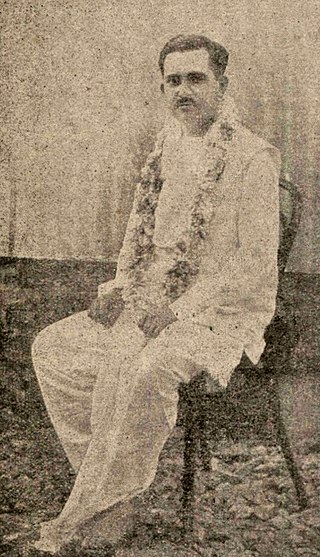The known and sometimes formally documented history of Mauritius begins with its possible discovery by Austronesians under the Austronesian expansion from pre-Han Taiwan, circa 1500 to 1000 BC, and then by Arabs,, followed by Portuguese and its appearance on European maps in the early 16th century. Mauritius was successively colonized by the Netherlands, France and Great Britain, and became independent on 12 March 1968.

Sir Anerood Jugnauth, GCSK, PV, was a Mauritian statesman, politician and barrister who served both as President and Prime Minister of Mauritius. He was Member of Parliament for Piton & Riviere Du Rempart. A central figure of Mauritian politics in the 1980s and 1990s, he was Leader of the Opposition from 1976 to 1982. He served four consecutive terms as prime minister from 1982 to 1995 and again from 2000 to 2003. He was then elected as President from 2003 to 2012. Following his party's victory in the 2014 general elections, he served his sixth and final term as prime minister, becoming the nation's longest serving prime minister with more than 18 years of tenure, overtaking Seewoosagur Ramgoolam, who held the office for 14 years.

Paul Raymond Bérenger is a Mauritian politician who was Prime Minister of Mauritius from 2003 to 2005. He has been Leader of the Opposition on several occasions – from 1983 to 1987, 1997 to 2000, 2005 to 2006, 2007 to 2013, October 2013 to 15 September 2014, and again from December 2014 to December 2016 when he was replaced by Xavier-Luc Duval. Following his party's defeat in the 2014 general elections, he became Leader of the Opposition for the sixth time, making him the longest ever to serve in this constitutional position. He was also deputy prime minister from 1995 to 1997 and again from 2000 to 2003, and he was a cabinet minister in the government of Anerood Jugnauth in 1982 and 1991. Bérenger, a Christian of Franco-Mauritian descent, has been the only non-Hindu prime minister of Mauritius, or, more particularly, the only prime minister who has not belonged to the Jugnauth or Ramgoolam families.

Sir Seewoosagur Ramgoolam, often referred to as Chacha Ramgoolam or SSR, was a Mauritian physician, politician, and statesman. He served as the island's only chief minister, first prime minister, and fifth governor-general.

The Mouvement Militant Mauricien is a left-wing socialist political party in Mauritius. The party was founded by a group of students in the late 1960s. The MMM advocates a "fairer" society, without discrimination on the basis of social class, race, community, caste, religion, gender or sexual orientation.

Since 1967, Mauritius has experienced 12 free and fair democratic general elections to choose a government.
The Labour Party is a centre-left social-democratic political party in Mauritius. It is one of four main Mauritian political parties, along with the Mauritian Militant Movement (MMM), the Militant Socialist Movement (MSM) and the Parti Mauricien Social Démocrate (PMSD). The party is led by Navin Ramgoolam. It tends to be more popular amongst Indo-Mauritians, especially in more rural areas.

Sir Abdool Razack Mohamed was an Indian-born former senior minister in the pre and post-independence cabinet of Mauritius.
Sookdeo Bissoondoyal was a Mauritian politician and one of the leading figures in the nation's independence movement.
Dev Virahsawmy was a Mauritian politician, playwright, poet and advocate of the Mauritian Creole language. Though he wrote easily in both French and English, Virahsawmy was most renowned for his efforts to popularise the use of Creole.
Guy Rozemont (1915–1956) was a Mauritian trade unionist and the third leader of the Mauritius Labour Party. He fought for workers' rights and voiced against the injustice done against them. He played a crucial role in shaping the government, political culture and foreign policy of modern Mauritius.
The Muslim Committee of Action, also known as the Comité d'Action Musulman or Comité d'Action Mauricien (CAM) was a political party in Mauritius.
The Independence Party was the name of a coalition of 3 major political parties on the island of Mauritius in the 1960s and 1970s. It was also commonly known as Parti de L'indépendance.
The 1975 Mauritian student protest riots refer to a students' protest marches which turned violent in various parts of the island of Mauritius, Indian Ocean on Tuesday 20 May 1975.

Basdeo Bissoondoyal was a Mauritian social worker, educator and writer who played an important role in the pre-Independence politics and independence movement on the island of Mauritius. He is also sometimes referred to as "Pandit Basdeo Bissoondoyal" or "Professor Basdeo Bissoondoyal".
Sir Satcam Boolell GCSK QC was a Mauritian politician who served as member of the Legislative Assembly in Mauritius. He died on March 23, 2006, in Curepipe. He was also known as "Somduth" by his peers and family members.
Harisun Boodhoo more commonly known as Harish Boodhoo, is a Mauritian political figure who served as Deputy Prime Minister of Mauritius from 11 June 1982 to 21 August 1983. He was elected Member of Parliament (MP) in 1976, 1982 and 1983 in Rivière des Anguilles and Souillac.
Lall Jugnauth was actively involved in pre-colonial and post-colonial Mauritian politics.
The All Mauritius Hindu Congress (AMHC) was a political party in Mauritius which existed from 1964 to 1967.
Abdool Wahab Foondun was a Mauritian politician who was active both before and after the Independence of Mauritius.






